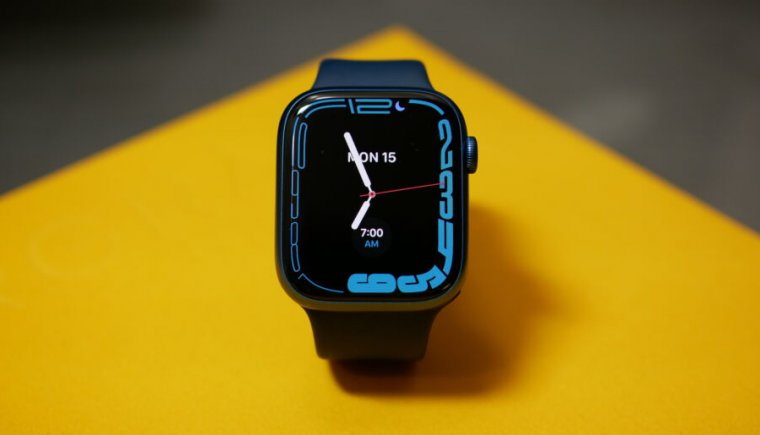
Corey Gaskin
One of the oldest complaints about new technology is that, by the time you get it, it’s already obsolete. But this year, Apple Watch Series 6 owners can breathe a sigh of relief, as the Apple Watch Series 7 is essentially the same device with a (largely imperceptible) facelift.
2021 won’t be the year we see an Apple Watch that can measure blood pressure (no major smartwatch can do so, for that matter), but it is the year we finally get an Apple Watch that charges fully in just over an hour. And that means a 10- or 30-minute dash on the charger goes much further now. Apple also introduced IPX6 dust resistance to the Watch for the first time, along with three new colors.
Oh, and there’s a full QWERTY keyboard option for text input.
Still, the Apple Watch remains the best-equipped and widely supported smartwatch on the market. Despite its top-tier sensor array (heart rate, ECG, blood oxygen, GPS), it’s still not the best fitness tracker. But Apple’s continued work on its paid fitness subscription, Apple Fitness+ (which requires an Apple Watch), does make a more compelling case for the Watch’s ability to improve your health.
Stronger screen, larger display, and a QWERTY keyboard
The Series 7 gives us the biggest physical change to the Apple Watch since the Series 4’s introduction. Just like the Series 4, the Series 7 ups the size of the watchcase to accommodate a rounder, more expansive display. In this case, the Series 7 is only one millimeter bigger and is now offered in 41 mm and 45 mm options. It uses the same-sized watchbands as Series 4 and later. The Series 7 has 20 percent more screen area than the Series 6, but neither the screen’s nor the case’s increased size is noticeable.
Sure, if you have a Series 6 next to a Series 7, and you’ve set a light-colored watch face, then you can see where the borders of the screen push farther into the bezel than previously. But this changes little of the experience of wearing, using, or looking at your Apple Watch, especially if you use a black watch face.
Apple claims that this very slight screen expansion facilitated the introduction of a full QWERTY keyboard for text input, and the expansion also allows for some slightly bigger buttons and three larger font sizes. But you can’t convince me that the Series 6 is too big for a keyboard, if one were available. Which it’s not.
-
The bigger Apple Watch Series 7 (left) and slightly smaller Series 6 (right) are essentially indistinguishable with a black watch face.
Corey Gaskin -
Light backgrounds better show how much bezel was trimmed from the facade.
Corey Gaskin -
Apple says this screen expansion enabled the addition of a QWERTY keyboard, which I found easy enough to text on, thanks largely to autocorrect.
Corey Gaskin -
Last year’s blue Apple Watch Series 6 (top) was a navy blue, while the new blue hue is lighter and closer to teal. Small changes like the speaker grill also betray the model differences.
Corey Gaskin -
The new mindfulness app adds a more engaging “reflect” exercise.
Corey Gaskin -
Apple’s new watch face emphasizes the more expansive screen. It actually grows on you.
Corey Gaskin -
The Series 7 introduces new colors: an army green, a lighter blue, and a silvery gold called “starlight.”
Pecking out a message on an Apple Watch is far from my favorite way to text (you can also swipe on the keyboard). But it’s better than drawing every letter. The keyboard gets the job done and does so with decent accuracy. Apple says that it learns from typing behavior on the Watch to train the predictive text function; no information from your iPhone’s keyboard goes into this training. Moving the cursor with the digital crown is a smoothly executed and useful feature. It’s also nice now to send a GIF response, but these are limited to the default #images app; no third-party clients like Giphy are currently supported.
In executing this facelift, Apple also tweaked the geometry of the screen. With 40 percent thinner bezels and a flatter bottom, Apple says the Series 7 has improved its durability and calls this the “most crack-resistant” screen yet.
The display itself also received a minor technological upgrade via software. When in always-on mode, the Series 7 can display at up to 70 percent higher brightness with your wrist down, depending on lighting conditions and the watch face displayed.
The 1,000 nit outdoor and 500 nit indoor max brightness remain in effect, but wrist-down brightness is now algorithmically optimized to achieve better visibility. Looking at a wrist-down Series 6 and Series 7, the contrast in brightness is noticeable without overdoing things. The difference is even more appreciable outdoors during daytime (or even nighttime) workouts.




